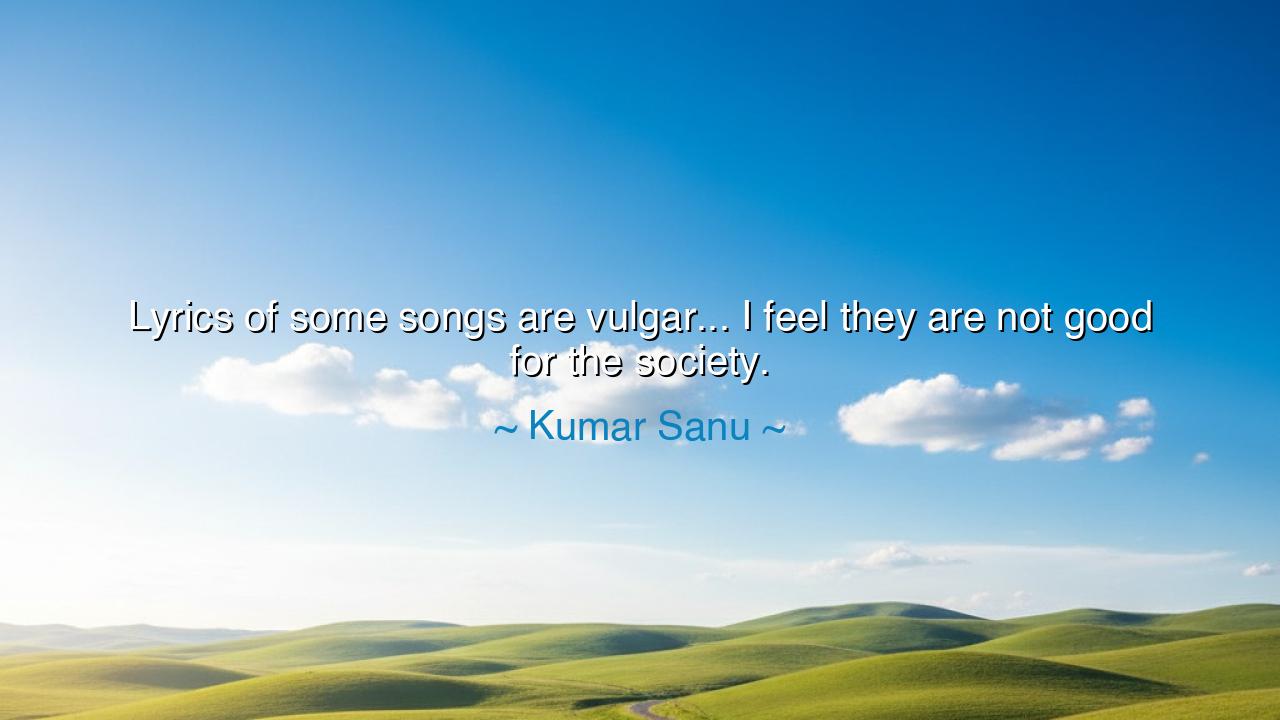
Lyrics of some songs are vulgar... I feel they are not good for






The words of Kumar Sanu—“Lyrics of some songs are vulgar... I feel they are not good for the society.”—resonate like the voice of a guardian reminding us of the sacred role of art. Music is not mere entertainment; it is nourishment for the soul, a force that shapes the spirit of individuals and the collective conscience of nations. When songs uplift, they become wings for the heart. When songs degrade, they sink the spirit into shadows. Sanu’s warning is thus clear: vulgar lyrics, though they may entertain for a moment, corrode the dignity of culture and weaken the moral fabric of society.
The ancients revered music as a divine force. In Greece, Plato cautioned that the wrong kind of music could corrupt the soul, while the right kind could discipline and elevate it. The sages of India declared that sound—nāda—was the essence of creation, and therefore sacred. If music is sacred, then the words that ride upon its melodies carry immense power. They can inspire devotion, courage, and love—or they can normalize vulgarity, selfishness, and degradation. Sanu’s words echo this eternal truth: that the lyrics of songs are not harmless, but formative, shaping the thoughts of the young, and the desires of all.
History gives us striking examples. During times of struggle, nations have turned to songs that elevated their spirits—patriotic hymns, folk ballads, and anthems that carried strength. In India’s fight for independence, songs of unity stirred courage in the hearts of ordinary people. Contrast this with times when societies have sunk into decadence, and one often finds music filled with triviality or vulgarity, reflecting and feeding moral decline. Thus, the lyrics of songs are both mirrors of society and instruments of its direction. What they glorify, people begin to imitate.
Kumar Sanu, as a legendary playback singer whose voice carried love and beauty to millions, speaks with the authority of experience. He has sung words that celebrated romance, tenderness, and the eternal bonds of human emotion. His lament about vulgar lyrics comes not from scorn, but from sorrow—sorrow that the noble gift of music is sometimes squandered on words that neither uplift nor inspire, but degrade. He reminds us that art must serve the good of society, not merely the craving of the market.
This teaching is deeply moral and profoundly practical. For what we sing, we begin to believe. What we hear repeatedly enters our subconscious and shapes our vision of life. Vulgar lyrics may seem small, but repeated across years, they can erode respect between men and women, trivialize love, and normalize disrespect. To dismiss them as “only songs” is to ignore the immense power of music to shape the heart. As the ancients taught, the education of youth must include the careful selection of songs and words, for these form the roots of character.
The lesson for us is clear: choose the music that uplifts rather than degrades. Support artists who use their craft to celebrate love, justice, beauty, and truth. Speak out when music glorifies vulgarity, for silence is consent. And above all, be conscious of what you allow into your mind and the minds of your children, for those words will one day flower into action. Music is a seed—plant wisely, and you will reap beauty; plant carelessly, and you will reap decay.
Practically, this means curating what we listen to, teaching the young the difference between passing entertainment and enduring art, and honoring those who, like Kumar Sanu, dedicate their voices to noble themes. It means remembering that every song we consume is a choice—not only for ourselves but for the kind of society we are building.
Thus, Kumar Sanu’s words endure as both warning and guide: “Lyrics of some songs are vulgar... I feel they are not good for the society.” Take this to heart. Let us demand from our art the highest, for art is not trivial. It is the echo of civilization itself. If we guard its purity, we protect the soul of our society; but if we neglect it, we risk raising generations who have forgotten the meaning of beauty, respect, and truth. And that, more than anything, is the loss we cannot afford.






AAdministratorAdministrator
Welcome, honored guests. Please leave a comment, we will respond soon